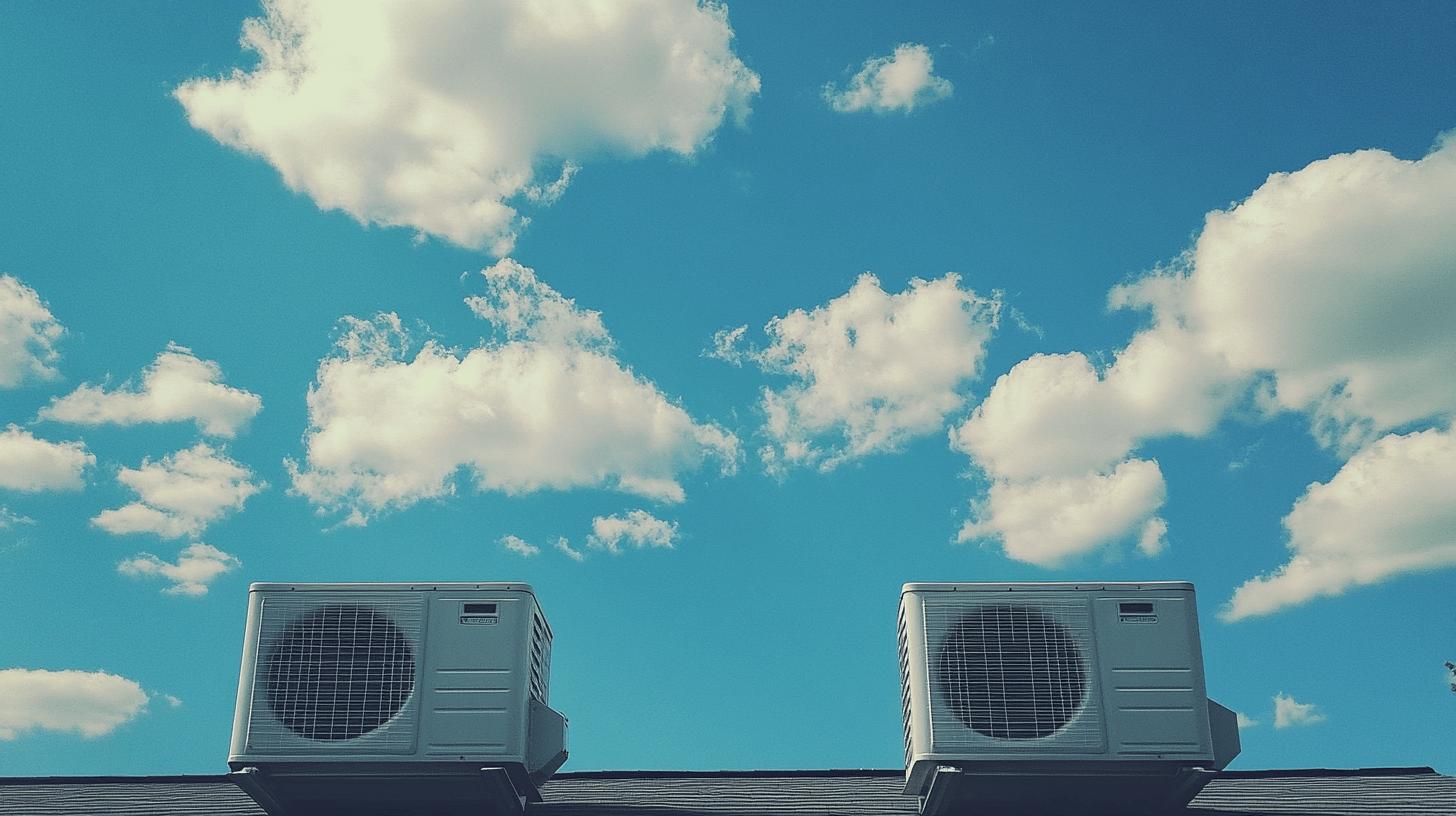TL;DR:
-
HVAC Types:
- Split Systems: Efficient for homes with ductwork.
- Packaged Systems: Combines heating/cooling in one outdoor unit, space-saving.
- Hybrid Systems: Indoor gas furnace + outdoor heat pump, flexible energy sources.
- Ductless Mini-Splits: Room-specific control, ideal for homes without ductwork.
-
Selection Factors:
- Climate, home size, insulation, energy efficiency, and budget are key.
-
Cost Estimates:
-
Split: ~$2,099.99; Packaged: ~$3,499.99; Hybrid: variable; Ductless: higher cost.
- Maintenance Tips:
- Regular filter checks, noise monitoring, programmed thermostats, and professional inspections are essential for efficiency.
Knowing when to replace your HVAC system can save you money on frequent repairs and high energy bills. Signs like poor airflow, strange noises, and bad odors often mean it’s time for a replacement instead of a repair. Understanding your system’s typical lifespan and maintaining it properly can help, but costly repairs often point to replacement as the better option.
Consider the factors that affect replacement costs, like system size, efficiency, and installation complexity. The $5,000 rule can help you decide when replacement is more cost-effective than repairing an old system.
Upgrading to a new HVAC system boosts energy efficiency and air quality. Replacing your system during off-peak seasons can also save you money.
Following these tips will help you keep your home comfortable and energy-efficient in the long run.
Understanding Different Types of HVAC Systems
When choosing an HVAC system for your home, comfort and efficiency are key. Each system has unique features tailored to different needs. Understanding these differences will help you select a system that fits your home’s requirements and local climate.
-
Split Systems: These include an outdoor unit linked to your home via power cables and insulated copper lines. They’re efficient and work well in homes with existing ductwork.
-
Packaged Systems: These combine heating and cooling in one outdoor unit, perfect for homes short on indoor space for separate systems.
-
Hybrid Split Systems: With an indoor gas furnace and an outdoor heat pump condenser, these systems offer flexible energy sources. They may cut energy costs depending on fuel prices.
- Ductless Mini-Split Systems: Ideal for temperate climates, these systems allow precise room-by-room temperature control. They are perfect for homes without ductwork or those needing cooling in specific areas.
The best HVAC system for your home depends on your needs. Split systems work well with existing ductwork, whereas packaged systems save space. Hybrid systems provide energy flexibility, and ductless systems offer targeted comfort without major renovations.
Factors to Consider When Choosing an HVAC System

Choosing the right HVAC system means looking at important factors to ensure comfort and efficiency. The size of your home and the local climate are key considerations. A professional Manual J calculation can help determine the best system size for your home by factoring in details specific to your space, like insulation and layout. This ensures you get the right system to keep your home comfortable year-round.
What factors should I consider when selecting an HVAC system?
-
Climate: Local weather heavily influences HVAC choice. In Las Vegas, systems must handle extreme heat, while in Miami, they must manage high humidity.
-
Home Size: The square footage and volume of your home dictate the HVAC system size. Larger homes need systems with greater BTU capacity.
-
Insulation: Proper insulation reduces energy use by maintaining stable indoor temperatures. Well-insulated homes may need smaller systems.
-
Energy Efficiency: Look for systems with high-efficiency ratings. These might cost more initially but save on utility bills over time.
-
Budget: Weigh the upfront cost against long-term operating expenses to find a system that suits your financial plan.
Consulting with professional HVAC technicians ensures a well-informed choice. They can perform Manual J calculations, confirming that your system is neither too large nor too small, thus optimizing efficiency and comfort.
Comparing HVAC System Efficiency and Costs
Energy efficiency is vital when picking an HVAC system. Efficient systems lower energy use and utility bills, making them a smart investment. Modern systems offer better energy performance, often with programmable thermostats for precise climate control. Good insulation and regular maintenance further enhance system efficiency.
Cost Ranges for Different HVAC Systems
| HVAC System Type | Starting Cost |
|—————————-|————————-|
| Split Systems | $2,099.99 |
| Packaged Systems | $3,499.99 |
| Hybrid Systems | Varies by configuration |
| Ductless Mini-Split Systems| Higher upfront cost, varies|
Installation costs vary by system type and home needs. Considering the long-term benefits of energy-efficient systems is important as they can lead to significant energy savings, making them cost-effective. Regular maintenance—like filter checks and professional inspections—ensures the system runs efficiently and extends its lifespan.
Pros and Cons of Popular HVAC Systems

Understanding the pros and cons of each HVAC system helps you choose one that fits your home’s comfort and budget needs.
-
Single-Stage Systems:
- Pros: Simple, less costly; ideal for steady temperature preferences.
- Cons: Less efficient in changing temperatures as they run at full capacity regardless of need.
-
Two-Stage Systems:
- Pros: More efficient, adjusts capacity to demand; quieter.
- Cons: Higher initial cost, which might increase investment.
-
Ductless Systems:
-
Pros: Allow room-specific control; good for homes without ductwork.
-
Cons: Higher upfront costs; might need more units for larger homes.
Consider your home’s needs when choosing a system. Single-stage systems are for stable temperature needs, two-stage for efficiency and comfort, and ductless for targeted cooling without large renovations.
What Type of HVAC System Do I Need? Find Out
Getting the right HVAC size is crucial. An oversized system may short-cycle, leading to energy waste and wear. An undersized one might struggle to maintain temperature, running constantly and hiking utility costs. To avoid these problems, assess your home’s needs with professionals who can make precise calculations for optimal system sizing.
Key Maintenance Tips:
-
Filter Checks: Replace filters every 1-3 months to maintain airflow and efficiency.
-
Noise Monitoring: Listen for unusual sounds that might signal issues.
-
Thermostat Settings: Use programmable thermostats to optimize energy use.
- Professional Inspections: Schedule regular HVAC checks to catch problems early.
Professional installation and maintenance are vital. They ensure your system’s efficiency and longevity, creating a comfortable and energy-efficient living environment. Prioritizing proper installation and regular care minimizes costs and maximizes investment.
Final Words
Choosing the right HVAC system means looking at different options like split, hybrid, and ductless systems while considering factors such as your home’s size and local climate. Each system type has its own efficiency and cost factors that can affect long-term savings and comfort.
Balancing the pros and cons—like energy savings versus upfront costs—will help you find the best system for your needs. Proper installation and regular maintenance are essential to keep your system running smoothly.
Knowing what type of HVAC system you need is crucial for creating a comfortable and efficient home.
FAQ
What type of HVAC system do I need for my house?
Determining the best HVAC system involves considering home size, climate, energy efficiency, and budget. Consulting a professional and using a Manual J calculation ensures accurate sizing and optimal system selection.
How do I know what HVAC system I need?
You can determine the right system by assessing factors like your home’s size, insulation, local climate, and energy efficiency needs. A professional consultation helps personalize these considerations for your home.
What are the four main types of HVAC systems?
The four main types include split systems, packaged systems, hybrid split systems, and ductless mini-split systems. Each offers unique advantages, such as flexibility in fuel use and room-specific temperature control.
What size air conditioner do I need for a 2000 sq ft house?
A 2000 sq ft house generally requires a 3 to 3.5-ton air conditioner, but precise sizing depends on additional factors like insulation and climate. Consulting a professional or using a sizing calculator can provide accuracy.
How many square feet will a 3-ton AC cool?
A 3-ton AC typically cools 1,500 to 2,100 square feet. However, factors such as insulation, climate, and personal comfort preferences can impact effectiveness. Professional assessment ensures better cooling efficiency.
What size HVAC system do I have?
You can identify your HVAC system size by checking the manufacturer’s label on the unit or reviewing installation paperwork. The tonnage or BTU rating indicates system size, often reflecting cooling capability.

